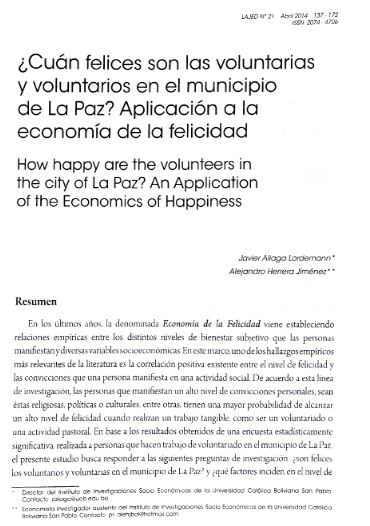How happy are the volunteers and volunteers in the municipality of La Paz? Application to the economy of happiness
DOI:
https://doi.org/10.35319/lajed.20142198Keywords:
Economy of Happiness, personal convictions, volunteerism and micro econometricsAbstract
In recent years, the so-called Economy of Happiness has been establishing empirical relationships between the different levels of subjective well-being that people express and various socioeconomic variables. In this framework, one of the most relevant empirical findings of the literature is the positive correlation between the level of happiness and the convictions that a person manifests in a social activity. According to this line of research, people who manifest a high level of personal convictions, be they religious, political or cultural, among others, are more likely to achieve a high level of happiness when they perform a tangible job, such as being a volunteering or a pastoral activity. Based on the results obtained from a statistically significant survey, carried out on people doing volunteer work in the municipality of La Paz, the present study seeks to answer the following research questions: are volunteers happy in the municipality of La Paz? Peace? And what factors affect the happiness level of volunteering? To answer this question, the authors use econometric estimates based on an Ordered Probit model. The main results of the study show that this group of people register high levels of happiness, and that variables such as beliefs of faith, gender, age, education, leadership and tangibility of work affect them.
Downloads
References
Binder, Martin y Freytag, Andreas (2013). “Volunteering, Happiness and Public Policy”.Max Planck Institute of Economics, University of Stellenbosch.
Easterlin, Richard (1974). “Does economic growth improve the Human lot? Someempirical evidence”. University of Pennsylvania.
Easterlin, Richard; Malgorzata, Switek y Sawangfa, Onnicha (2010). “The happiness-income paradox revisited”. National Academy of Sciences, USA.
Fernández, Carlos y Hernández, Roberto (1991). Metodología de la investigación. México: McGrawHill, primera edición.
Frey, Bruno S. y Stutzer, Alois (2002). Happiness and Economics: How the Economy and Institutions Affect Human Well-Being. Princeton University Press.
----------(2010). Happiness and Economics. Princeton University Press.
Greene, W . H. (2000). Econometric Analysis. New Jersey: Prentice Hall, Fourth Edition.
Hackl, Franz; Halla, Martin y Pruckner, Gerald J. (2007). “Volunteering and Income. TheFallacy of the Good Samaritan?’’ Kyklos, 60 (l), 77-104.
Howard, Marc Morjé y Gilbert, Leah (2008). “A Cross-National Comparison of the Internal Effects of Participation in Voluntary Organizations”. Political Studies, 56 (l), 12-32.
Johns, Helen y Ormerod, Paul (2007). “Happiness,Economics and Public Policy”. The Institute of Economic Affairs. London.
Layard, Richard (2006). “Happiness and public policy: a challenge to the profession". The Economic Journal, 116 (510), C24-C33. ISSN 0013-133.
Layard, R.; Mayraz, G . y Nickell, S. (2008). “The marginal utility of income”. Journal of Public Economics, 92, 1846-1857.
López, Borja y Guijarro, María (2011). “Relación empírica entre educación y felicidad. Evidencia en SHARE”. Universidad de Cantabria.
Meier, S. y Stutzer, A. (2008). “Is volunteering rewarding in itself?”. Economica, 75: 39-59.
Osgood, C. E., Suci, G. y Tannenbaum, P. (1957). The measurement of meaning. Urbana, IL: University of Illinois Press.
Sen, A. (1989). “Development as Capabilities expansion". Journal of Development Planning, 19: 41-58.
Son, H. (2011). "Equity and Well-Being: Measurement and Policy practice". Asian Development Bank.
Stevenson, Betsey y Wolfers, Justin (2008). “Economic Growth and Subjective Well-Being: Reassessing the Easterlin Paradox”. The National Bureau of Economic Research, NBER. Working Paper N° 14282.
Stevenson, Betsey y Wolfers Justin (2009). “The Paradox of Declining Female Happiness”. American Economic Journal: Economic Policy, 1:2, 190-225.
Schubert, C. (2011). “Pursuing happiness: Can 'happiness politics’ promote civil virtues? Mimeo.
The Earth Institute (2013). “The World Happinnes Report”. Columbia University.
Thoits, Peggy y Hewitt, Lindy (2001). “Volunteer work and well-being. Journal of Health and Social Behavior, 42 (2). 115-31. Vanderbilt University.
Veenhoven, Ruut (2007a). Measures of Gross National Happiness. Erasmus University Rotterdam, OECD.
-------- (2007b). “How universal is happiness?". MPRA Paper.
-------- (2010). "Greater happiness for a greater number”. Journal of Happiness Studies, 11 (5), 605-629.
-------- (2013). "The Easterlin illusion: economic growth does go with greater happiness”. MPRA Paper.






